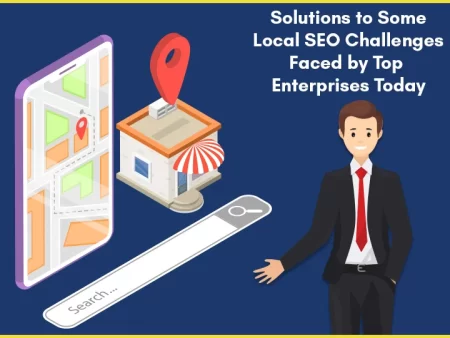 Many companies find that local SEO is challenging because they first need to have a national SEO strategy, then properly set up their Google Business Profile, and finally learn how Google handles priority search queries in different markets. This opens an infinite number of challenges – some of which are more common than others. Here’s a look at some of the most common ones.
Many companies find that local SEO is challenging because they first need to have a national SEO strategy, then properly set up their Google Business Profile, and finally learn how Google handles priority search queries in different markets. This opens an infinite number of challenges – some of which are more common than others. Here’s a look at some of the most common ones.
Knowing When to Prioritize National vs. Local SEO
It’s challenging to know which of these to prioritize because you don’t always know if your top target keywords have local intent, but you need to do so. Understanding Google’s mentality here enables you to develop your keyword strategy. For this, you’ll need to look at the local search intent to see what’s featured. To identify search intent, you’ll need to analyze current SERP outcomes across different geos, consistency, and the SERP for a map element. Make sure you also look for geo-specific pages, even checking titles and URLs for this information.
Having a Single Source of Truth for Location Data
While this isn’t a problem for businesses that only have a single location, those that have multiple locations oftentimes struggle here. It’s important to have a single source of truth for all your location data, though, as this is something that Google will look for.
Optimizing Store Locators
If you choose to outsource your store locators to third-party vendors, there are a few things you’ll want to watch out for. One of the main ones has to do with how the content is built. You’ll want to be sure to include relevant location page content (e.g., topics relative to the location) to improve your local SEO performance. Doing so will enable Google to see that your page really is relevant for that category.
Google Business Profile (GBP) Optimization and Management
This isn’t something that should be challenging for you if you think of it as a yellow-page listing for your business locations. Unfortunately, there are a million ways it can go wrong. Some of these include:
- Creating duplicate listings makes it difficult to rank for the main keyword you’re targeting. This difference can be as much as 15 positions.
- Monitoring your Google Business Page listings is essential. You can’t just build them and forget about them because they’re in a constant state of flux as users add photos and leave reviews. It’s also important to understand that Google will overwrite your data if it trusts information from another source more than it trusts you. Additionally, you must remember that not every change can be seen on your dashboard.
- Scale your Google Business Page posts by creating and attaching short announcements to them. This is an inexpensive way for you to generate high-converting traffic for your website. You can include text, photos, and videos in these posts.
- Make sure you produce content for each of your locations. Each of them must be promoted as its own entity. The best way to handle this is to create content and a GBP-sized version (400 x 300) of marketing images that are approved for use by your company.
- Tag links from your Google Business Page posts with tracking parameters. This will allow you to measure their performance.
Building a Local SEO Presence for SABs and Marketplaces
This is something that won’t apply to everyone since not every local enterprise brand has more than one location. There are many local businesses (e.g., Yelp, DoorDash, Zillow, SABs) that Google doesn’t allow to appear in Local Packs because they don’t have any physical locations. Therefore, they miss out on a lot of potential traffic and revenue. Sometimes this can be remedied by creating a “store within a store” at a partner brand’s location (e.g., FedEx OnSite in Walgreens). Of course, if there’s enough value to it, you may want to consider opening a physical location in certain areas to improve your local SEO.
There are many tactics that you can deploy to move your company ahead in local SEO today. Unfortunately, it isn’t as easy as doing all these things. Instead of throwing caution to the wind, you need to test, measure, and iterate just like you would with any other marketing channel. Therefore, you should leave this all to the experts at the Local SEO Tampa Company in Tampa, FL.
